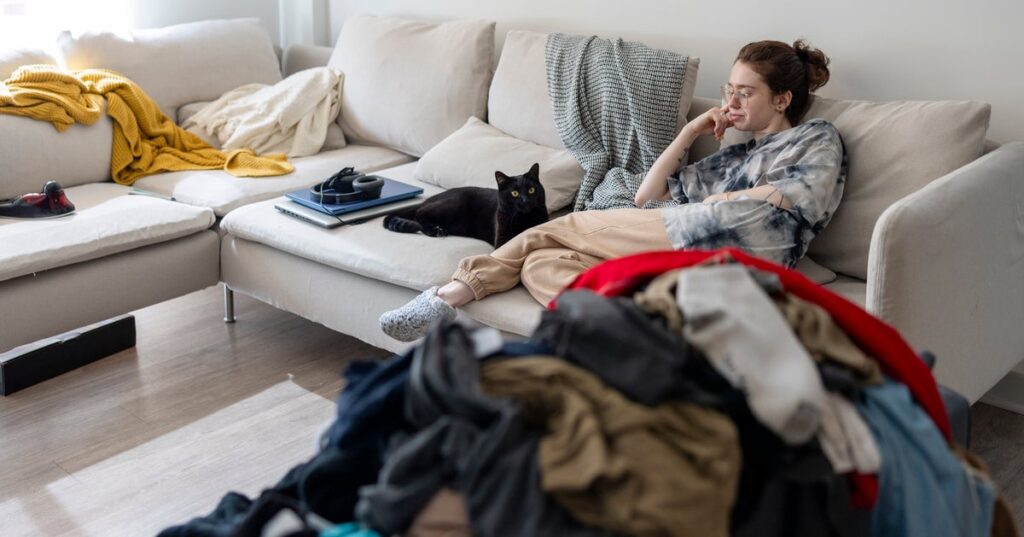There’s something so satisfying about returning home from vacation to a clean and organized home. But pet owners might want to make a small adjustment to their pretravel cleaning routine.
If you’re leaving your dog or cat at home with a sitter during your vacation, experts suggest not doing a full deep clean before your departure. And more specifically, you should consider leaving behind some unwashed clothes you’ve worn.
The idea is that leaving even just a few pieces of laundry that smell like you can be comforting to your pet while you’re away.
“Comfort through scent is real for many of us, including our pets,” Dr. Carly Fox, a senior veterinarian with Schwarzman Animal Medical Center’s emergency and critical care service told HuffPost. “The familiar scent can be calming and help your pet feel safe and secure.”
Your pet may like to smell and snuggle with your clothing and feel that connection in your absence, so put it in a prominent place where they spend time ― like their bed or favorite spot on the couch.
“Leaving unwashed pieces of clothing at home is a simple yet effective technique I often recommend for both dogs and cats,” said Cristy Brusoe, a cat behaviorist and owner of Cat Training by Cristy. “Our scent provides a strong source of comfort and familiarity, especially when routines are disrupted ― such as during vacations or extended absences. For cats in particular, who are highly sensitive to environmental changes, the presence of a familiar scent can be incredibly grounding.”
You might consider waiting to wash your pet’s bedding and toys until after you’ve returned as well to foster a comforting environment.
Dr. Grant Little, a veterinarian expert with JustAnswer, believes that there’s limited data to support the idea that leaving a piece of clothing with your smell will reduce separation anxiety, but he noted that there’s nothing wrong with trying this method.
“It’s a harmless thing that people do in order to reduce their pets’ separation anxiety,” he said. “I have never seen it really change a situation, but because it’s harmless, it won’t be an issue to try it.”
Linda Raymond via Getty Images
What else can pet owners do before going on vacation to help their animals feel secure?
The laundry tip isn’t the only way to make your pet feel more secure and comfortable while you’re away from home.
“Ideally, you should hire a pet sitter to be with your pets while you are away,” Fox said. “This allows your pets to stay in their own environment and maintain a sense of routine.”
In a perfect world, you’ll already have a pet sitter with experience spending time with your pet in your home — or you can take steps to foster comfort in advance.
“If you are opting to use a sitter that is new to your pet, it’s crucial that you allow for several opportunities for your pet to meet and greet the sitter before you leave,” said Dr. Amy Fox, a veterinarian at Kinship. “Allow them to build a positive association with the sitter by taking part in short visits, play sessions, and lots of praise and treats in their familiar environment. This will go a long way in ensuring they feel comfortable and bond with their sitter.”
(For dogs who like spending time in other environments, you might have a regular pet sitter who takes care of them in their own home, which can easily become another familiar place.)
“If you have a pet sitter coming in intermittently throughout the day, use technology to keep in touch with your pet and make sure they are OK,” Dr. Carly Fox advised. “This can include cameras and automatic treat and food feeders.”
She also recommended keeping their space calm and inviting, particularly if your pet gets anxious from outside stimuli.
“You can play music to drown out sound and draw the curtains to keep the space quiet and secure-feeling,” Dr. Carly Fox said. “Try to keep your pet’s mind off of your absence by providing enrichment toys like treat puzzles.”
Mental stimulation can reduce stress and keep them busy. And because pets thrive on routine and familiarity, try to keep their environment generally stable.
“Avoid rearranging furniture or introducing major changes before you leave,” Brusoe said. “Stick to regular feeding and play schedules. Ask your sitter to mirror your usual routines as closely as possible.”
She also suggested pheromone diffusers or sprays, like Feliway for cats or Adaptil for dogs, to create a calming atmosphere while you’re away. Calming chews and collars are also an option.
“If your cat or dog tends to have a harder time with separation, a consultation with a behaviorist ahead of time can help create a personalized plan,” Brusoe noted.
You can also speak to your veterinarian about appropriate calming aids and even medication to treat separation anxiety.
“We commonly give anti-anxiety medications at low doses for separation anxiety, and this can have good effects,” Little noted. “Separation anxiety can be a really big issue. If you have a pet that gets nervous anytime you leave the house, then you really should consider working this up with your veterinarian for various treatments. It can lead to destructive behaviors, such as tearing open doors, jumping out windows, biting on couch cushions, or urinating around the house. All of these issues break the human-animal bond, and that can make care for them more difficult.”
He also emphasized the importance of tackling the issue early rather than later if you’re noticing signs of separation anxiety.
“Being proactive about your pet’s emotional wellbeing while you’re away is one of the most loving things you can do,” Brusoe added. “The unwashed laundry tip is just one of many tools in the toolbox ― small actions can make a big difference in how your pet experiences your absence. And remember, always ease back into normal routines when you return, rather than overwhelming your pet with too much too soon.”
Read the full article here








